News
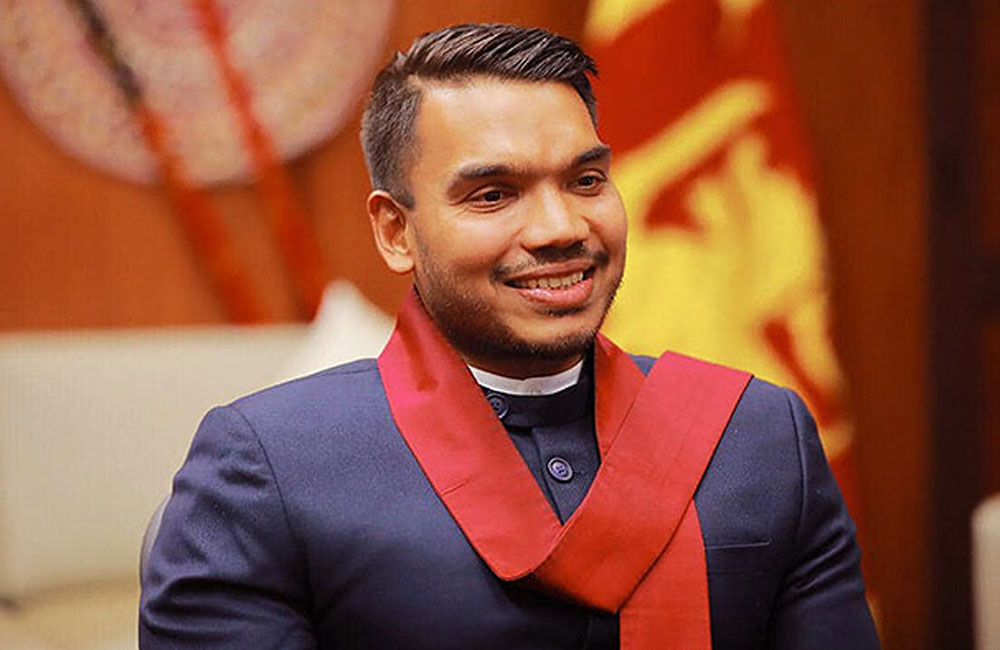
Namal Rajapaksa Rejects Allegations Over Academic Qualifications
Sri Lanka Podujana Peramuna (SLPP) National Organizer Namal Rajapaksa today dismissed the claims circulating about his academic qualifications, describing them as baseless and politically motivated.
Speaking to journalists, Rajapaksa said the reports questioning his degree were “completely false,” adding that an official investigation had already been initiated soon after the current government took office.
He noted that within weeks of coming to power, the government submitted a B-report to court seeking approval to investigate his degree, and that inquiries have been ongoing for several months.
“Yet no report has been submitted to the court. Despite this, false claims continue to circulate online,” he said.
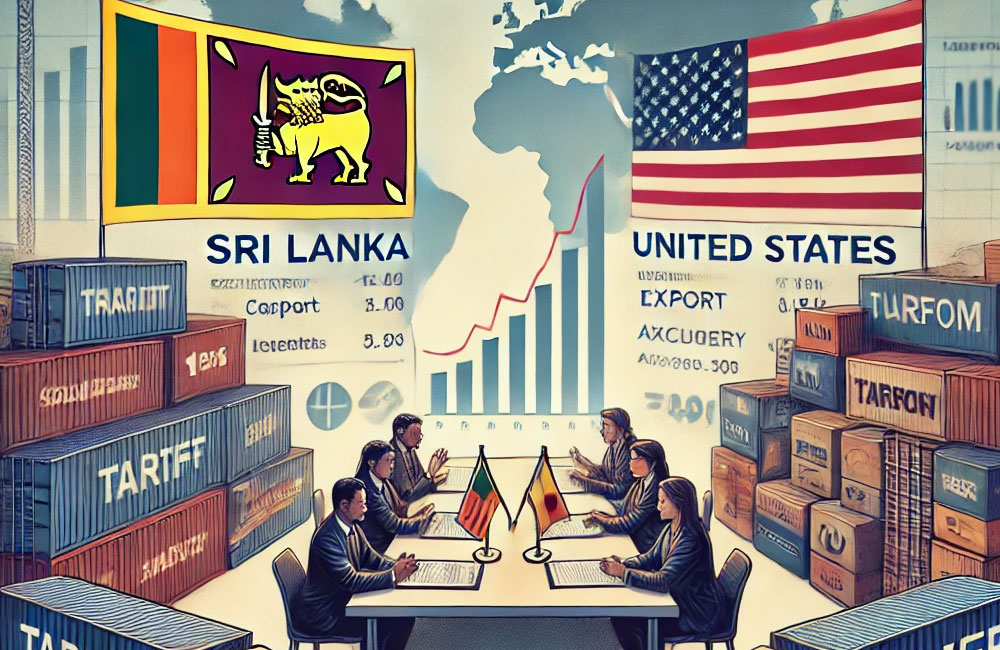
US Tariff Relief Offers Reprieve for Sri Lanka, But Risks Still Loom
Sri Lanka is yet to reach any final agreement to be inked with the US on reciprocal tariffs, and discussions are still underway regarding the matter, Foreign Minister Vijitha Herath said. He said that SL and the US have had 17 rounds of discussions so far.
The Minister said SL was able to get the tariffs reduced from 44% to 20% through discussions and added that the US Prez Donald Trump, in an order issued on Nov 13, brought some food items exported by SL to zero tariff.
In 2024, Sri Lanka exported around US$ 3 billion mainly garments and rubber goods to the US, while imports from America amounted to just US$ 370 million. Bridging this imbalance has become central to US demands.
Officials close to the talks say the US team is pressing for market access in machinery, agriculture, and consumer goods, sectors where Sri Lanka’s local producers already struggle.
Economists warn that meeting such commitments without a broader strategy could weaken domestic industries and aggravate the very vulnerabilities that plunged the country into crisis in 2022.
University of Colombo economist and Central Bank Monetary Policy Board member Prof. Priyanga Dunusinghe cautioned that Sri Lanka’s approach has been narrowly limited to tariff negotiations.
“Export diversification has not progressed, the business environment remains weak, and productivity has not improved, leaving Sri Lanka exposed to external shocks like the recent US tariff hike,” he said at the CEO Forum 2025.
A recent Institute of Policy Studies (IPS) study has already projected losses of US$ 634 million in export earnings under the new tariff regime, highlighting the heavy toll on apparel the single largest contributor to exports. Yet despite these risks, Colombo has yet to move beyond ad hoc bargaining.
The global context makes the challenge sharper. Washington’s new protectionism targets goods trade deficits while excluding services, where Sri Lanka depends heavily on US technology flows.
This tactic reflects wider apprehensions about Asia’s rise, with China, India, and Indonesia are to be among the uppermost global economies by 2030. The situation is gradually hostile for small countries without geopolitical leverage,
Prof. Dunusinghe gave the example of Singapore as a good counter-factual. Within weeks of the US tariff action, it had rolled out a five-pillar strategy building competitiveness, driving innovation, re-skilling the workforce, supporting transitioning industries, and developing linkages with open-trade nations.
“Sri Lanka has not moved beyond talks on tariff concessions. Heavy dependence on apparel exports continues, and no systematic reforms have been implemented to expand products or markets,” he warned.

Happy 250th Birthday, Marines! U.S. Embassy Hosts Historic Celebration in Colombo
The U.S. Embassy in Sri Lanka proudly celebrated the 250th Birthday of the United States Marine Corps at the annual Marine Corps Ball on November 15, honoring a quarter-millennium of the Corps’ unwavering commitment to its timeless values: Honor, Courage, and Commitment.
Ambassador Julie Chung hosted the event which welcomed senior Sri Lankan defense leaders—including Deputy Minister of Defense Major General Aruna Jayasekara (retd.), Secretary to the Ministry of Defense Air Vice Marshal Sampath Thuyacontha (retd.), and other military dignitaries—along with members of the diplomatic corps and partners from across Sri Lanka.
This year’s celebration comes as the United States prepares to mark 250 years of independence in 2026, a reminder that the freedoms Americans cherish have endured because of generations of Marines who have stood faithfully on the front lines of defense.
A centerpiece of the celebration was the presence of Chief Warrant Officer Five (CWO5) Damon M. Hines, one of the Marine Corps’ most senior warrant officers, who served as the evening’s guest speaker. His participation held special meaning with the attendance of his son, Staff Sergeant Chris Hines, currently serving as a Marine Security Guard in Colombo—representing three generations of Marines upholding the Corps’ highest ideals. In keeping with tradition and the spirit of the occasion, CWO5 Hines presided over the reenlistment of two Marines from the Embassy detachment—an honor that reaffirmed their continued dedication to the Marine Corps' core values and to the defense of the United States.
Ambassador Julie J. Chung delivered remarks honoring the Marine Corps’ distinguished legacy:
“As we celebrate 250 years of the United States Marine Corps, we honor a legacy built on Honor, Courage, and Commitment. These values have carried Marines through every challenge—on the shores of Tripoli, across the Pacific, and today at diplomatic posts around the world. Our Marine Security Guards in Colombo live these values every day, and as America approaches its own 250th birthday, we are reminded that the freedoms we cherish endure because Marines stand always faithful. Semper Fidelis — Always Faithful.”
In marking this historic milestone, the Embassy also reflected on the legacy described in President Trump’s proclamation on the 250th Anniversary of the Founding of the United States Marine Corps, which commemorates the Marines’ extraordinary contributions across generations:
“The Marine Corps was born in the fires of revolution when the Second Continental Congress established the Continental Marines by resolution on November 10, 1775. From the first combat action at Nassau in 1776, Marines have proven to be ruthless in battle, and lethal guardians of liberty and justice. From that moment onward, the Marines have helped shape the destiny of our Nation, fighting beside Andrew Jackson at the Battle of New Orleans, standing firm in the trenches of World War I at Belleau Wood, where they earned the nickname ‘Devil Dogs,’ and seizing victory after victory across the Pacific at Guadalcanal, Iwo Jima, and Okinawa. They confronted communism in Korea and Vietnam, upheld the right to self-government in the Persian Gulf, and brought justice to our enemies in the deserts and mountains of the Global War on Terror. Marines protect our embassies abroad, and ensure our Federal law enforcement can do their jobs here at home. Wherever liberty has been threatened, the Marine Corps has answered with strength, courage, and unyielding honor.”

PRESS RELEASE

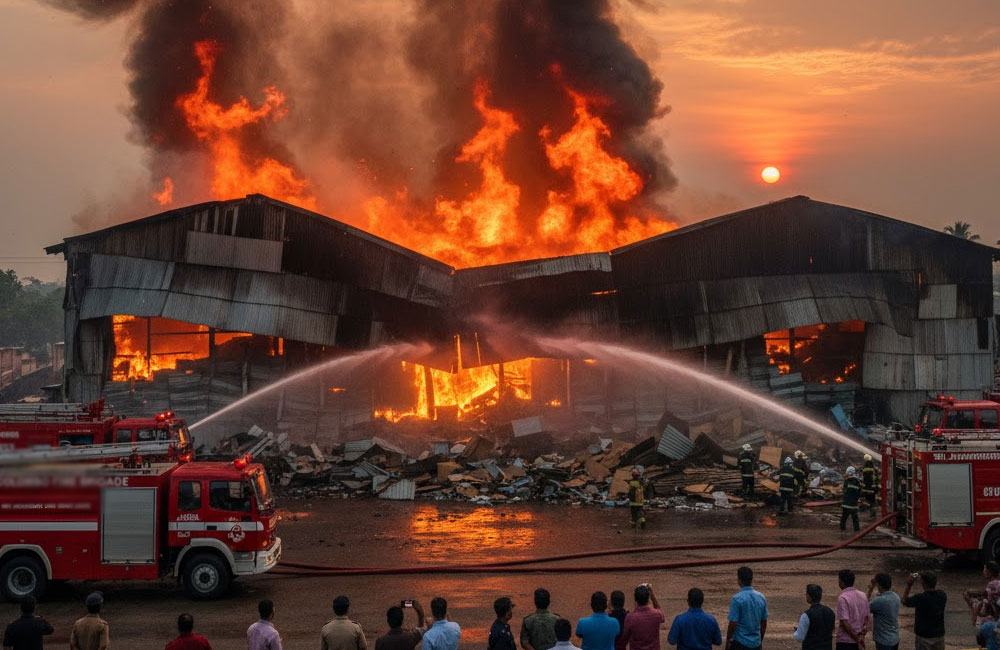
Fire Erupts at Ranala Factory Storage Facility
A fire broke out in the storage facility of a factory in Ranala, Kaduwela early this morning (19), police said.
According to the Nawagamuwa Police, the factory—which manufactures cardboard-related products—has suffered extensive damage as a result of the incident.
Firefighting units from the Colombo Municipal Council and the Sri Jayewardenepura Kotte Municipal Council were dispatched to bring the blaze under control.
The total extent of the damage is yet to be assessed, while the cause of the fire has not been determined, police further stated.

Illegal Hotel Threatens Sinharaja’s Fragile UNESCO Forest and Water
Local residents and environmental groups are sounding the alarm after what they say is the clandestine clearing of roughly one acre of peripheral forest to lay foundations for a hotel on the edge of the Sinharaja World Heritage area.
The site identified by villagers as part of the Nildeniya (Nilgala) reserve near Suriyakanda and Kadu Muduwa falls within a legally protected buffer that was gazetted in 2011, and community leaders warn the work is already damaging a vital high-altitude biodiversity zone and the springs that supply nearby villages.
Field accounts gathered from residents and the chairman of the Nildeniya Pooja Water Society describe heavy-handed tree felling and foundation work immediately adjacent to transmission towers and inside a zone covered by the Soil Conservation Act.
Villagers say the site includes headwater catchments that feed drinking water supplies for Suriyakanda and Kadu Muduwa fragile hydrological systems that are extremely sensitive to vegetation loss and soil disturbance.
The community has filed complaints with the Suriyakanda Police and notified the Department of Forest Conservation, the Land Reclamation Commission and the Kolonna Divisional Secretariat, seeking urgent intervention.
This episode echoes earlier confrontations over infrastructure and tourism development around Sinharaja. In recent year’s petitions and media exposes flagged illegal roads and hotel proposals inside the Sinharaja periphery, prompting public outcry and defensive statements from government departments denying formal approvals.
Environmental campaigners argue those denials often fall short of stopping on-the-ground destruction, which proceeds via local land grabs or approvals by lower-level authorities that circumvent ecological safeguards.
Why this matters: Sinharaja is one of Sri Lanka’s last extensive tracts of low-country rainforest and a globally recognized reservoir of endemic species. Even peripheral clearances degrade its ecological integrity by fragmenting habitat, opening invasion pathways, altering microclimates and disrupting groundwater recharge effects that accumulate and amplify the island’s broader problem of falling forest cover.
Once headwater vegetation is removed, streamflow becomes flashier, dry-season baseflows decline and sediment loads rise outcomes that harm both biodiversity and human water security.
Legally and politically, the incident raises several immediate questions: who authorized or tolerated the clearance; whether the site truly lies inside gazetted reserve boundaries; whether enforcement agencies will act decisively; and whether local land records have been manipulated to mask illegal transfers.
The persistence of such episodes suggests gaps in on-the-ground monitoring, slow legal recourse and patchy coordination between conservation, land and local government bodies.
If the state fails to stop this encroachment, the damage will extend beyond one acre. Losses to Sinharaja’s peripheral forests are losses to Sri Lanka’s natural capital biodiversity, water security and ecotourism potential and they erode the credibility of protections surrounding a UNESCO site.
Authorities should immediately publish boundary maps, suspend all works, investigate land title transfers, and restore cleared areas under supervision of independent ecologists. For the communities that depend on the springs below, time is not on their side.

Deputy Minister Arun Hemachandra to Attend 4th EU–Indo Pacific Ministerial Forum in Brussels
Deputy Minister of Foreign Affairs and Foreign Employment, Arun Hemachandra, will undertake an official visit to Brussels, Belgium, from 19 to 22 November 2025 to participate in the 4th EU–Indo Pacific Ministerial Forum.
During the visit, the Deputy Minister is scheduled to take part in the high-level sessions of the Forum, which brings together leaders and representatives from Europe and the Indo-Pacific region to discuss cooperation, security, connectivity, and sustainable development.
In addition to the main sessions, Deputy Minister Hemachandra is expected to hold a series of bilateral meetings with senior European Union officials and other dignitaries. Discussions will focus on areas of mutual interest, including trade, labour mobility, investment, maritime cooperation, and strengthening political ties between Sri Lanka and the EU.
The visit underscores Sri Lanka’s ongoing efforts to deepen engagement with the EU and enhance its presence in the Indo-Pacific policy landscape.
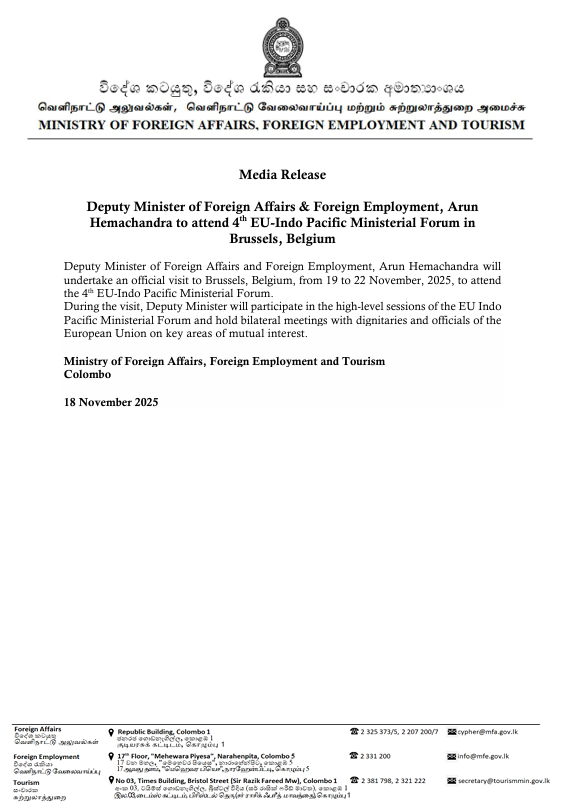

End of Monopoly Era: New Film Council to Liberate Lankan Cinema
The government is to set up Sri Lanka National Film Council with the aim of modernising the film industry and shift the state's five decade role from a business competitor to a regulatory and promotional body.
With the objective of creating a strategic orientation with regard to the sectors that are not covered by the Sri Lanka National Film Corporation, fundamental draft bill has been prepared in relation to the structure and role of the proposed Film Council.
The Sri Lanka National Film Corporation Act No. 47 of 1971 will be repealed and replaced with new legislation to establish the Sri Lanka National Film Council.
It will provide a strategic direction for areas not covered by the old law and focus on regulating and promoting cinema culture. Industry stakeholders have long called for the NFC to be a regulator, not a competitor.
However, exhibitors argue that decades-old restrictions particularly the rigid quota system limiting film imports are crippling the Rs. 10 billion industry.
Sinhala cinema is thriving at present, with six films this year earning over Rs. 200 million each. Box office revenues have already surpassed Rs. 1.5 billion in the first half of 2025, compared to just Rs. 7 million in 2024.
Private investors are building new multiplexes in cities such as Kandy and Galle, but warn that without regulatory reform, growth will stall, they said.
Although the, 1971, 1987-1889 insurrections, three decade North East war and other minor revolts including Easter Sunday bomb attacks exerted impact on the industry, NFC’s monopoly in distribution and import of films has caused the down fall of the industry , industry stake holders alleged.
As corporation was the sole distributer of films no good content was provided to cinemas resulting in patrons moving away from film going culture that was once very vibrant in the country.
When distribution partially liberalized in 2001 , four private film distribution circuits Lanka Film Distributors Ltd. (LFD), E.A.P. Films and Theatres Ltd. (EAP), Movie Producers and Importers Ltd. (MPI), Cinema Entertainment Ltd. (CEL) entered the market in addition to the NFC have been permitted to import and distribution of films .
They urged the government to limit the NFC’s role to a regulatory body and to fully liberalise film distribution, allowing for private sector involvement without bureaucratic constraints.
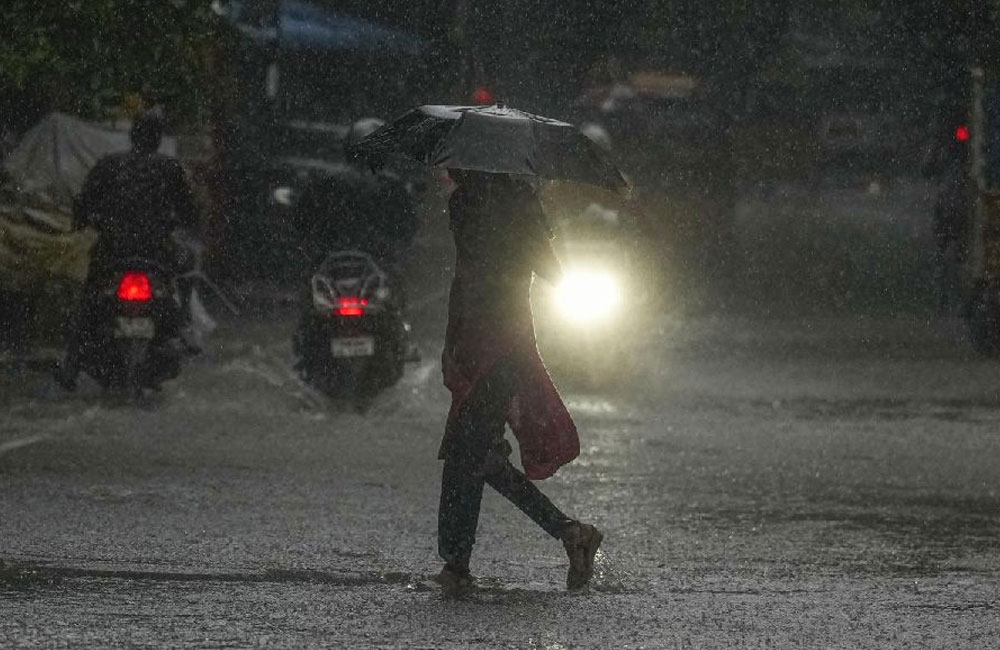
Several Spells of Showers Expected Across Multiple Provinces Today
Several spells of showers are expected in the Northern, North-Central, and Eastern provinces today (19), the Department of Meteorology announced.
Showers or thundershowers are also likely to develop in several areas of the Western, Sabaragamuwa, Southern, and Uva provinces, as well as in the Nuwara Eliya district, particularly after 1.00 p.m.
Misty conditions are forecast during the early hours of the morning in parts of the Sabaragamuwa, Central, Uva, and Southern provinces.
Meanwhile, the public is advised to take necessary precautions to minimize the risks associated with temporary strong winds and lightning during thundershowers.
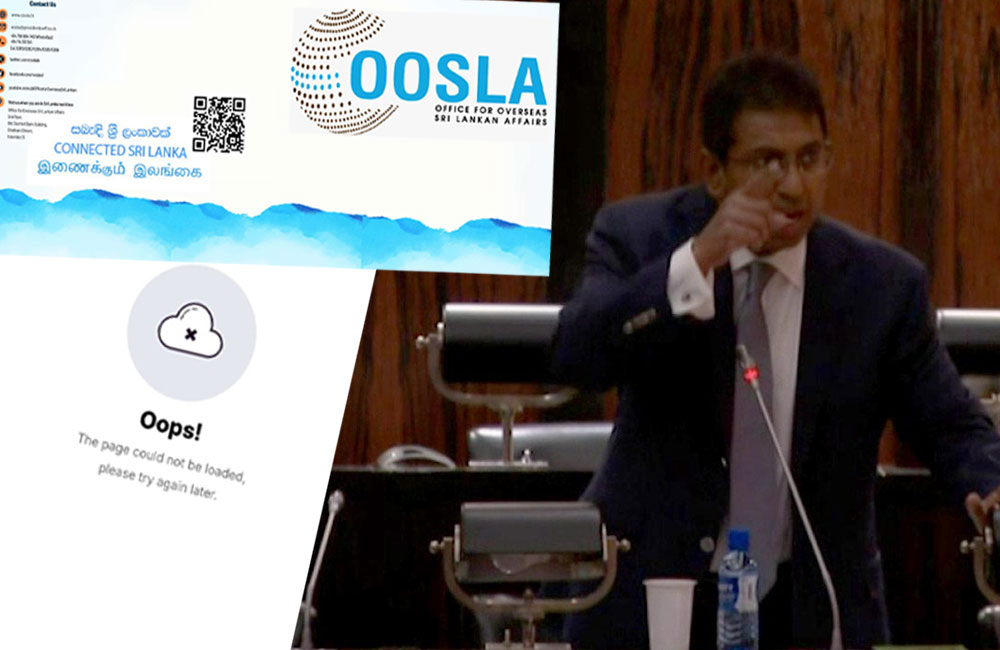
“Oops” is Not a Foreign Policy: Why I Demanded a Radical Shift in Our Foreign Policy Today
Today in Parliament, during the Committee Stage debate on the Foreign Ministry’s expenditure head, I felt compelled to challenge the traditional view of how Sri Lanka engages with the world. I listened to the Minister of Foreign Affairs, hoping for an articulation of a modern policy stance that justifies our budget allocations, but instead, we heard the usual rhetoric.
Foreign Policy is Economic Strategy
We can no longer afford to operate in silos. I stated clearly on the floor that we need to stop separating foreign policy from our economic survival.
As I argued in my speech, the truth is unavoidable: “We need to think of foreign policy in terms of economic strategy. Forget all the rhetoric... we have to be dynamic, understand how the world is moving, and use our foreign policy as an economic strategy. If you look at the growth we require, it is all going to be external: exports, investments, remittances, and tourism.”
Even our debt restructuring was fundamentally a foreign policy success before it was a financial one; it was because we built strong relationships with countries like India and China that we were able to navigate the crisis.
The Digital Failure: The “Oops” Moment

However, our implementation is lagging woefully behind this necessary vision. We talk about a "Digital Sri Lanka" and attracting the diaspora, yet our digital infrastructure for investors is non- existent.
I highlighted a specific example regarding the Office of Overseas Sri Lankans. When I attempted to access the digital portal for this office, posing as a Sri Lankan living abroad looking to invest, I hit a dead end.
“Assume I am an overseas Sri Lankan and I want to invest... I go to the Ministry of Foreign Affairs [website] and it says 'Oops.' ‘Oops’ is not a foreign policy,” I told the government. “If your official website says economic diplomacy is key... and it doesn't exist, I am asking the Honorable Minister if the Office of Overseas Sri Lankans actually exists.”
We cannot expect serious investment when our front door to the world is digitally broken and directs potential investors to an error page.
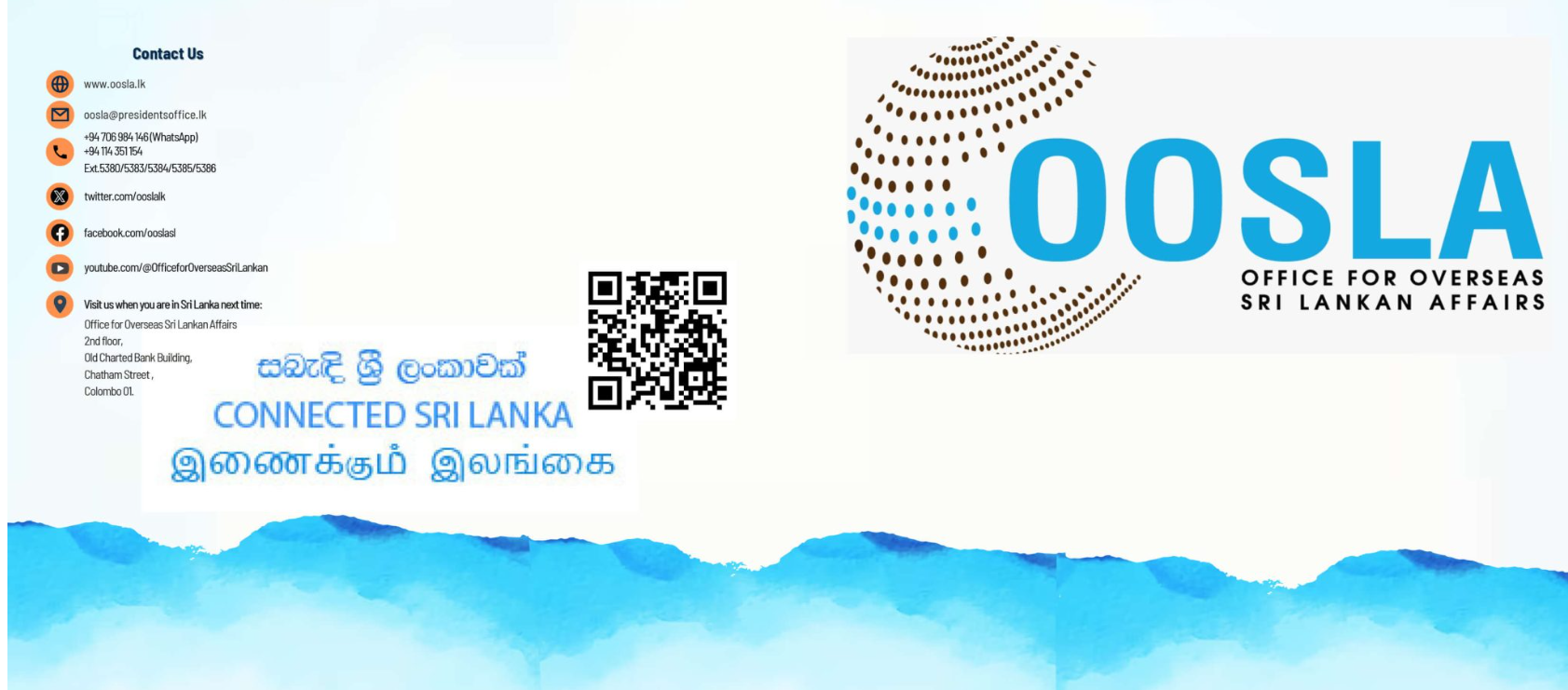
Addressing Governance and Accountability: The Geneva Pledge
I pointed out that while the government may claim to be taking a "reasonable middle path" in its international commitments, its actions at home severely undermine that position.
The core issue is the failure to credibly implement the four-pillar structure promised to the world: Truth, Justice, Accountability, Reparations, and Non-Recurrence. This failure is evident in the makeup of the proposed agencies.
● I highlighted the recent criticism leveled at the government for appointing three out of five members from the security sector to the proposed Reparations Committee.
● This imbalance undermines confidence and cannot work. The Government ought to ensure that these promised agencies are established and implemented with genuine credibility to finally resolve these long-standing national problems.
Recognizing Our Two Types of Sri Lankans Overseas
The Ministry must understand the complex issues facing our citizens abroad and engage with them as two distinct, yet equally vital, groups:
● Economic Backbone: These are the workers in West Asia and Southeast Asia who send home the highest amount of dollars and are fundamentally responsible for building our foreign reserves. Their welfare and support must be prioritized.
● The Disconnected Diaspora: These are the Sri Lankans living in Western nations who often feel left behind and disconnected. They are calling for engagement and dialogue with the Ministry to understand the issues they face. The Ministry must open genuine channels of communication with them.
We Must Punch Above Our Weight Class: Seizing the Transactional Opportunity
We must stop viewing Sri Lanka as a small, passive island. We are at the center of the Indian Ocean, critical to global trade routes and data cables. We have leverage, and we must use it.
“We have an amazing opportunity because of our positioning in the global context. We must punch above our weight class... We have to be able to make sure that our foreign policy is such that we balance the East and the West,” I stated.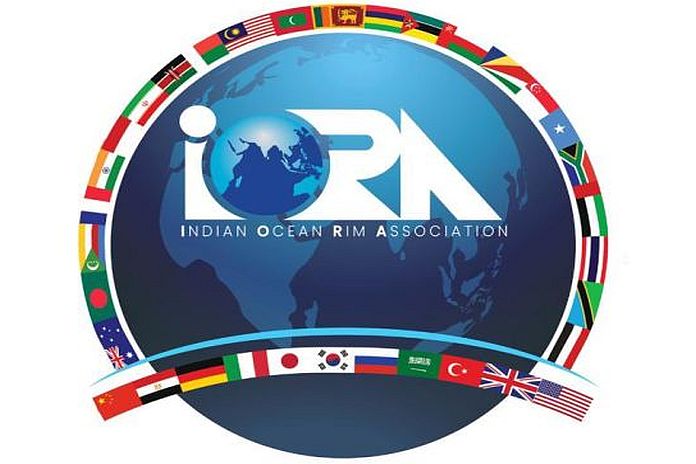 IORA
IORA
This strategic positioning demands a pragmatic foreign policy built on transactionalism. Our focus must be on results, not rhetoric concerning allegiances, blocs, or West vs. East divisions.
I highlighted how we have already squandered a critical chance by failing to use our IORA Chair to initiate a robust collaborative framework built around trade and economic security. The new opportunity, however, lies in the recent cooperation between China and India. This creates an ideal geostrategic opportunity for us to profit.
We must shift our foreign policy mindset from allegiance to advantage. We need a return on investment for every dollar we spend on our missions abroad. Nothing less is acceptable.
By Dr. Harsha de Silva, MP

239 players compete across Sri Lanka as 6-Red Snooker National Championship heats conclude
The Billiards and Snooker Association of Sri Lanka (BSASL) has successfully completed the district stages of the 6-Red Snooker National Championship 2025, held in memory of the late Amjad Hashim.
The tournament, which has attracted widespread participation across the island, has been strongly supported by the Malship Group of Companies, the championship’s principal sponsor.
BSASL expressed its gratitude to the Malship Group for its ongoing commitment to the development of cue sports in Sri Lanka, noting that their backing was instrumental in the smooth execution of the tournament.
The Association also acknowledged the contributions of local clubs and venues that hosted the district competitions, ensuring professional organisation and facilities for participants.
A total of 239 players competed in the district tournaments, held in Nuwara Eliya, Kandy, Kegalle, Ratnapura, Galle, and Colombo.
The Colombo District saw the highest participation with 134 entries, highlighting the growing popularity of snooker nationwide.
District champions crowned during the preliminary rounds include:
Nuwara Eliya: Champion O.T. Samith, Runner-up Nadeera Hewawasam (Thawalama Snooker and Pool Parlour, Hatton)
Kandy: Champion M. Fauzan, Runner-up M.S. Hamjhad (Pyramid Snooker Parlour, Kandy)
Kegalle: Champion Musthaque Mohamed, Runner-up Musamil Deen (Blue Waters Snooker Parlour, Mawanella)
Ratnapura: Champion Sajith Balaharuwa, Runner-up Jithma Nugawela (Cue Masters Snooker Club, Ratnapura)
Galle: Champion M. Farhan, Runner-up Maithri Lalith (YMBA, Galle)
Colombo: Champion Mohammed Fahim, Runner-up Prathap Murugesh (Moors Sports Club, Colombo)
The district champions and runners-up will now progress to the All-Island segment, where 32 top players, proportionally allocated by district participation, will compete in a round-robin format to determine the 2025 national champion.
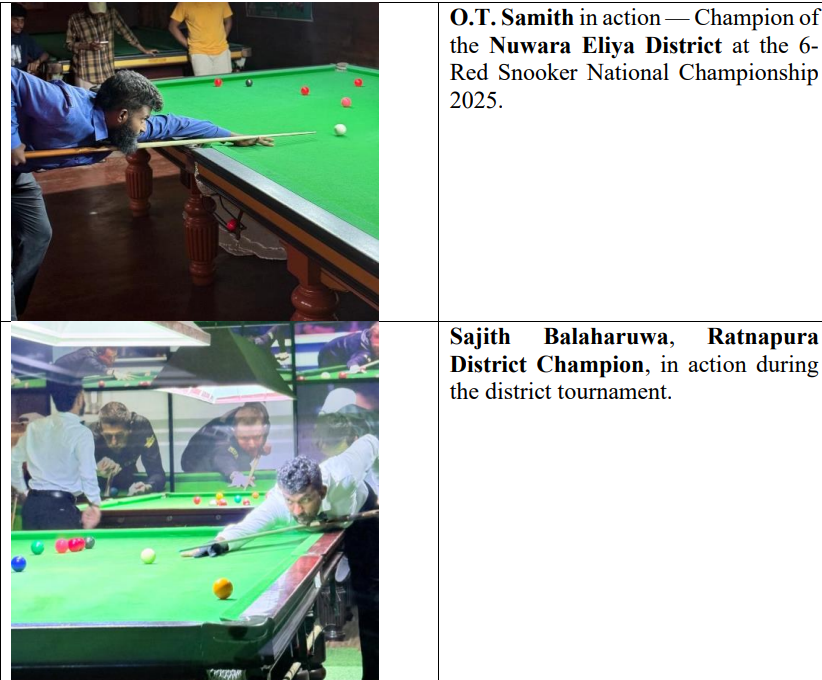
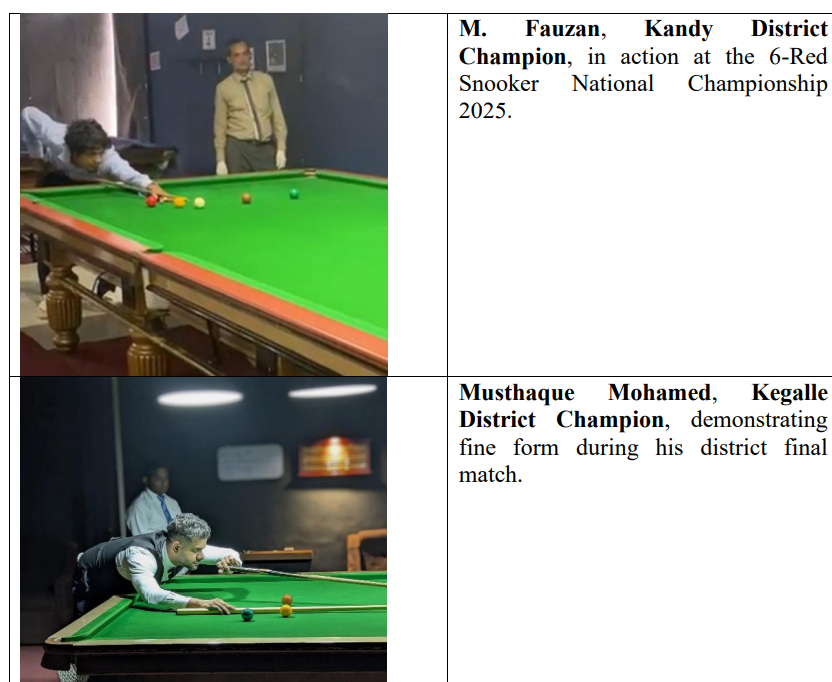

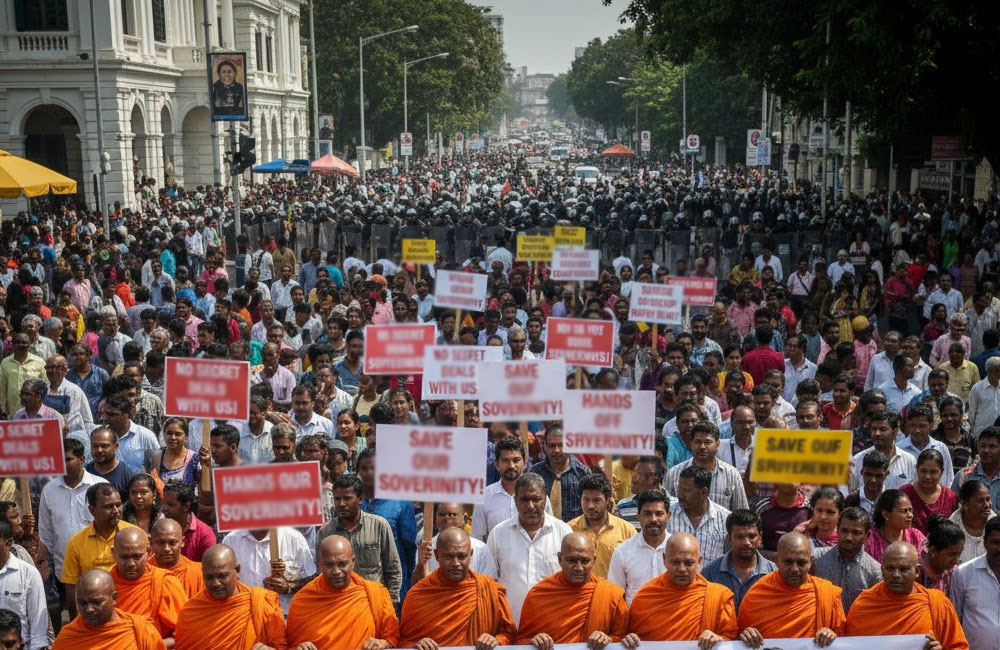
Secretive US-Sri Lanka Defence Pact Sparks National Outrage
Sri Lanka’s political landscape has been jolted by fierce public backlash following the government’s decision to sign a Defence Memorandum of Understanding with the United States under the State Partnership Program (SPP).
The MoU, endorsed at a high-profile ceremony in Colombo recently attended by the U.S. Ambassador inSri Lanka Julie Chung, establishes formal defence cooperation between Sri Lanka’s Ministry of Defence, the Montana National Guard, and the U.S. Coast Guard District 13.
At the ceremony, the U.S. Ambassador framed the agreement as a continuation of a partnership built over several years.
She highlighted joint training exercises since 2021, from humanitarian missions such as ATLAS ANGEL 2024 and PACIFIC ANGEL 2025 to Coast Guard training on oil-spill response in Seattle.
According to her, the SPP “is not merely about defence it is about connection, shared learning, and building long-term bonds between the American Midwest and Sri Lanka.”
Yet these warm diplomatic sentiments have ignited a political firestorm at home. Opposition MPs, civil society groups, Buddhist clergy, and national security analysts sharply condemn the government’s refusal to reveal the full contents of the agreement.
The criticism is particularly pointed because the ruling NPP led by the once staunchly anti-American JVP built its political identity opposing U.S. military influence. Now, after assuming power, several of its frontline leaders appear to have reversed their ideological stance, fueling allegations of political hypocrisy and backdoor diplomacy.
The secrecy surrounding the MoU has become the central flashpoint. Critics warn that the SPP, active in over 100 countries, has historically included military interoperability components that could pave the way for deeper U.S. strategic involvement.
Though the Ambassador emphasized that the 30-year-old program fosters global cooperation and professional exchange, Sri Lankan lawmakers argue that without public disclosure, there is no guarantee that the agreement does not create obligations that undermine national sovereignty.
Analysts also note the timing: Sri Lanka, still grappling with economic instability, a fragile geopolitical balance, and dependence on foreign creditors, is increasingly vulnerable to external pressure.
Any opaque defence alignment especially with a major global power could strain relations with China and India, both of whom view the Indian Ocean as a strategic priority. Diplomatic missteps could jeopardize trade negotiations, security cooperation, and regional positioning at a moment when Colombo can ill afford miscalculations.
The controversy also risks eroding public trust. Sri Lankans vividly remember debates around past U.S. agreements such as SOFA and MCC, both of which ignited public protests and were ultimately shelved due to fears of allowing foreign military access. The NPP government’s silence now raises fears of repeating history.
Unless the full text of the MoU is released, speculation will fill the vacuum ranging from concerns about data-sharing to fears of establishing logistical support for U.S. military operations in the region. Transparency, analysts say, is the only path to restore credibility and prevent the widening political rift.
Sri Lanka’s strategic future depends not merely on partnerships, but on public confidence in how those partnerships are forged. Without openness, even beneficial cooperation risks turning into national discord.

India’s US exports jump despite 50% tariffs as trade tensions ease
India’s goods exports to the US rose for the first time in five months in October, jumping 14.5% from September, even as Donald Trump’s steep tariffs remain in place.
Exports to India’s largest foreign market had dropped sharply last month after 50% US tariffs on India - including a 25% penalty for buying Russian oil - kicked in on 27 August.
The improved data came as Indian state-run oil firms agreed to import more annual liquified petroleum gas (LPG) from the US and Trump exempted many farm goods from reciprocal tariffs that could benefit India.
Trade deal negotiations between the two countries are under way, with an Indian official saying that key aspects of the deal were nearing closure.
The jump in exports to the US came even as India’s overall goods exports fell 11.8% year-on-year in October, with 15 of its top 20 markets seeing a decline in bilateral trade.
“Tariff-exempt sectors such as smartphones and pharmaceuticals may have performed better - though this remains a tentative assumption,” said Ajay Srivastava of Global Trade Research Initiative (GTRI), a Delhi-based think tank, commenting on the latest trade numbers.
“Despite the October rebound, India’s shipments to the US have dropped nearly 28.4% between May and October, erasing more than $2.5bn in monthly export value,” Mr Srivastava added.
But trade tensions between the two countries appear to be gradually letting up after months of uncertainty.
On Monday, India said it had concluded a first-ever major deal that will see its state-run oil companies sourcing some 10% of the country’s annual LPG needs from the US.
Petroleum Minister Hardeep Singh Puri described the decision as a “historic development” and said the world’s largest and fastest growing LPG market has now opened up to the United States.
The Trump administration has been urging Delhi to ramp up its purchase of US petroleum products and reduce its dependency on Russian oil.
India became one of the biggest markets for Russian oil as Western nations imposed sanctions on Moscow after the Ukraine war started in 2022.
Last year, India bought $52.7bn of Russian crude - 37% of its oil bill - but Trump has reiterated time and again, that the country has agreed to reduce its purchases, something India has not officially confirmed.
Delhi is walking a diplomatic tightrope on energy imports as Russian President Vladimir Putin prepares to visit Delhi early next month to finalise several agreements and projects, local reports say.
Yet trade talks between India and the US - stalled for months over Delhi’s refusal to cut Russian oil imports - now appear to be moving quickly despite this.
On Monday, a senior government official told The Hindu newspaper that the first phase of the trade deal is “more or less near closure”.
India is also set to benefit from the US’s decision to roll back reciprocal tariffs on certain agricultural products such as tea, coffee and spices - a move that, analysts say, would effectively exempt about $1bn worth of India’s agricultural exports to the US from duties.
( Source : adaderana.lk)
Page 58 of 663